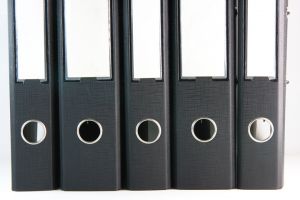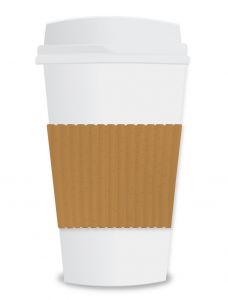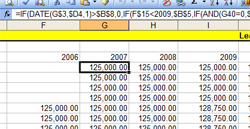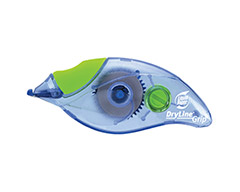 Along with indexes, leadsheets, and tickmark legends (all stuff for future posts), accountants believe in workpaper references. Workpaper references are an important part of an accountant’s system and much care is given to setup the appropriate structure. Having a good setup can reduce the number of binders and help accountants locate work faster.
Along with indexes, leadsheets, and tickmark legends (all stuff for future posts), accountants believe in workpaper references. Workpaper references are an important part of an accountant’s system and much care is given to setup the appropriate structure. Having a good setup can reduce the number of binders and help accountants locate work faster.
Workpaper references are the unique identifier for each document (e.g. FR-1). Often each subsection or page will have a different workpaper reference. Examples include having a section of workpapers be ‘A’ and subsections as A-10, A-50, A-100, and so on.
Accountants cannot consider work to have been done without putting a workpaper reference on it. Typically, signoff and dates are also attached. As workpaper references are extremely important to accountants, accountants have highly developed systems of workpaper references and are proud of their own unique setup, which was basically copied from preceding accountants. These workpaper reference systems, while intended to be straightforward, often change over time, and you will frequently find white out where workpaper references reside.
Accountants won’t refer to a workpaper with a name that makes sense (e.g. AP Reconciliation); instead they must use an ambiguous workpaper reference (e.g. G-30.2). If you were to eavesdrop on accountants, half of the conversations would involve ‘Are you sure that’s the right workpaper reference?’
Workpaper references are important to accountants because it demonstrates that there is order to the chaos that typically engulfs the profession. It allows accountants to organize information in an orderly fashion and be creative in their naming scheme (e.g. use ‘Q2C’ instead of Quote to Cash).
Tags: #6, Workpaper References
Posted in List | 1 Comment »
 Accountants depend on coffee so much that it might be necessary to list Coffee and Caffeine separately. While I’m sure you and I enjoy coffee, do you value coffee enough to spend almost $10 a day at Starbucks? Accountants do during busy season.
Accountants depend on coffee so much that it might be necessary to list Coffee and Caffeine separately. While I’m sure you and I enjoy coffee, do you value coffee enough to spend almost $10 a day at Starbucks? Accountants do during busy season.
The standard ritual is to arrive in the morning and get coffee while your laptop takes 1/2 hour to start up. After returning from lunch and catching up on e-mails, it’s time once again to go get another cup. In fact, anytime an accountant starts feeling less than 100%, coffee is the way to go.
Coffee comes in many forms. Accountants can get coffee at Starbucks, local shops, office kitchens, instant espresso machines, and have been known to settle on tea in desperate times. Coffee is often accompanied by cookies, scones, danishes, or other snacks. It’s not always enough for an accountant to order a skinny latte, accountants sometimes have to get almond toffee cookies as well.
If you took away coffee from accountants, you could pretty much short the market as companies would all be delinquent in their required filings. Coffee really is the solution to everything, and as such, accountants can never have too much coffee.
Tags: #5, Coffee
Posted in List | 2 Comments »
 This one shouldn’t come as a suprise at all: accountants love excel formulas. Formulas are wonderful things that can update fields, add amounts, and solve equations. Once it’s entered in, all an accountant needs to do is copy it 200 times and the work is done.
This one shouldn’t come as a suprise at all: accountants love excel formulas. Formulas are wonderful things that can update fields, add amounts, and solve equations. Once it’s entered in, all an accountant needs to do is copy it 200 times and the work is done.
If you were to approach an accountant at work, you will find multiple excel spreadsheets open. Even more spreadsheets can be found if they have a dual monitor setup. Accountants feel more comfortable with Excel than most things in their lives.
The beauty of Excel is that even when all the work is done in Excel and checks out, accountants can spend as much time formatting the work for presentation as they did creating the work. Spare functions in Excel such as drawing arrow objects, highlighting cells, and formatting decimal places bring pleasure to accountants as they seek to wrap up their work.
It doesn’t matter that what they have been working on is nothing new and that there are endless templates available for them to use. The time spent working with formulas and formatting a workbook is a precious way for an accountant to express their investment of time.
Tags: #4, Excel Formulas
Posted in List | 5 Comments »
 How do you distinguish between a good accountant and a great accountant? Starting pulling FASB statements out of a hat and see who can name more paragraphs. Advanced accountants can quote the individual sentences and tell you why you’re wrong.
How do you distinguish between a good accountant and a great accountant? Starting pulling FASB statements out of a hat and see who can name more paragraphs. Advanced accountants can quote the individual sentences and tell you why you’re wrong.
FASB stands for Financial Accounting Standards Board and is the basis for Generally Accepted Accounting Principles (GAAP). All this means is that FASB represents important accounting guidance in the US. Conversations between career accountants will involve discussions on accounting treatment by citing FASB and other standards. In between quoting FASB, you will likely hear accountants gossipping about people they work with.
If you really want to impress an accountant, you can ask their opinion about the mark to market accounting of FAS 157, a recent financial hot topic, and let them express themselves. This will cast you as someone who cares and is knowledgeable about their profession. Be careful though! If your accountant friend is inexperienced, they may not know the FASB you are quoting and make them feel embarrassed.
Tags: #3, Quoting FASB
Posted in List | Comments Off

Ever received a birthday card that was whited out and then written over again? You have an accountant friend.
White out, along with other tools such as calculators, rulers, and binder tabs (all stuff for future posts) are key staples of the accountant trade. Accountants tend to write with specific colored pens, and rely on white-out when they make mistakes. Either that or reprint the ream of workpapers. (Both happen a lot.)
Amongst accountants, white out is considered an art. Experienced accountants have a greater level of skill when it comes to whiting out specific numbers in tiny text or the little area between boxes. The less experienced accountants have to rely on whiting out the whole section and then recreating it by hand.
You can use this to your advantage by having spare white out available. To an accountant, this says that you are a person that they can count on in their times of need.
Tags: #2, White Out Tape
Posted in List | 2 Comments »
 Accountants don’t sleep. While they don’t know what ‘work / life balance’ is, it doesn’t matter because it doesn’t really exist anyways.
Accountants don’t sleep. While they don’t know what ‘work / life balance’ is, it doesn’t matter because it doesn’t really exist anyways.
During busy season, lots of red bull, coffee, soda, snacks, candy, and anything are consumed at all times in order to stay productive. From waking up early, commuting, and taking 1/2 hour to start up the laptop, accountants don’t get to rest until they get home after midnight. Even then, accountants have been known to study for the CPA exam or catch up on Tivo.
Why would someone sacrifice much needed sleep in order to watch the latest reality show and dramas from Hollywood? Answer: they need to stay on top of Lost and Heroes so that they have something to talk about during the awkward silences known as lunch.
A typical conversation getting in to work is asking how late the other person stayed to work last night. Being able to say that you worked until 1 AM on the purchasing process and going home to catch up on some episodes of Lost is met with much respect. That is until their superior shows up and mentions how revenue contracts took until 2 AM and they finally saw the latest episode of the Office.
Tags: #1, Not Sleeping
Posted in List | 2 Comments »
 Along with indexes, leadsheets, and tickmark legends (all stuff for future posts), accountants believe in workpaper references. Workpaper references are an important part of an accountant’s system and much care is given to setup the appropriate structure. Having a good setup can reduce the number of binders and help accountants locate work faster.
Along with indexes, leadsheets, and tickmark legends (all stuff for future posts), accountants believe in workpaper references. Workpaper references are an important part of an accountant’s system and much care is given to setup the appropriate structure. Having a good setup can reduce the number of binders and help accountants locate work faster. Accountants depend on coffee so much that it might be necessary to list Coffee and Caffeine separately. While I’m sure you and I enjoy coffee, do you value coffee enough to spend almost $10 a day at Starbucks? Accountants do during busy season.
Accountants depend on coffee so much that it might be necessary to list Coffee and Caffeine separately. While I’m sure you and I enjoy coffee, do you value coffee enough to spend almost $10 a day at Starbucks? Accountants do during busy season. This one shouldn’t come as a suprise at all: accountants love excel formulas. Formulas are wonderful things that can update fields, add amounts, and solve equations. Once it’s entered in, all an accountant needs to do is copy it 200 times and the work is done.
This one shouldn’t come as a suprise at all: accountants love excel formulas. Formulas are wonderful things that can update fields, add amounts, and solve equations. Once it’s entered in, all an accountant needs to do is copy it 200 times and the work is done. How do you distinguish between a good accountant and a great accountant? Starting pulling
How do you distinguish between a good accountant and a great accountant? Starting pulling 
 Accountants don’t sleep. While they don’t know what ‘work / life balance’ is, it doesn’t matter because it doesn’t really exist anyways.
Accountants don’t sleep. While they don’t know what ‘work / life balance’ is, it doesn’t matter because it doesn’t really exist anyways.